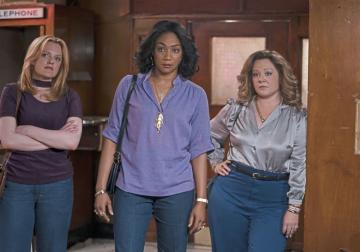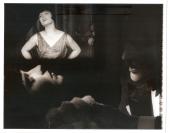'The Kitchen' — a female-focused mob drama likely to offend everybody
A woman’s place is in “The Kitchen” — Hell’s Kitchen, to be exact — where she must cook up a survival plan during her husband’s lengthy absence.
It’s actually three women and three husbands — low-level Irish mobsters who run the protection racket in their gritty neighborhood. At the outset, the boys get caught in a botched shakedown and are dispatched to spend a few decades behind bars — having made no provisions for the little ladies at home.
Kathy (Melissa McCarthy), Ruby (Tiffany Haddish) and Claire (Elisabeth Moss), after much penniless pondering, plead for employment with their hubbies’ bad-ass local boss Jackie (Myk Watford), who promptly kicks them out with a heavy helping of threats and insults.
- Starring: Elisabeth Moss, Melissa McCarthy, Tiffany Haddish, Domhnall Gleeson.
- Rating: R for violence, pervasive language and some sexual content.
It’s 1978. Jobs — legal and illegal alike — are scarce. “Face it,” Kathy laments, “we’re never gonna do anything but have babies.”
The Three Amigas in this female-focused crime drama have nothing but a financial crisis in common. Individually, their skill sets are minimal but, collectively ... they wanna be collectors, on the basic operating theory: Yeah, it’s a rotten, sleazy, immoral business, but if somebody’s going to do it, it might as well be open to women.
Soon enough, they’re not just doing but excelling at the erstwhile business of their men, who are safely locked away for 20 years.
But the hubby homecoming comes inconveniently sooner than expected.
“The Kitchen” is the feature-film directorial debut of actor-writer Andrea Berloff, who was Oscar-nominated for her “Straight Outta Compton” screenplay in 2015. Her script here, based on the Vertigo comic book series by Ollie Masters and Ming Doyle, is full of extremely rough language and dialogue, with something to offend just about everybody, including Orthodox Jewish rabbis, corrupted like everyone else by having to pay for protection.
That script is full of gratuitously bloody violence and more coffins than you can shake a pallbearer at, plus a lot of late-plot confusion. But two of the three lead performances are terrific: McCarthy, who honed her skills at The Actors Studio in — where else? — Hell’s Kitchen, is as fine here as in her starring role on TV’s “Mike & Molly” and her Oscar-nominated turn in last year’s “Can You Ever Forgive Me?”
Haddish, on the other hand, is not terribly convincing in her first big dramatic film role.
But Moss as mousey Claire, with her straggly bleached hair and pasty complexion, is constantly victimized until she hits her breaking point. Best known for the wildly popular “Mad Men” and more recently “The Handmaid's Tale,” Moss proves she’s one of America’s best contemporary actresses in a series of great scenes with psychotic-romantic Gabriel (Domhnall Gleeson, son of Brendan, of Harry Potter franchise and “The Revenant” fame) — most notably, one in which she gets a useful anatomy lesson from him while cutting up Jackie’s body for disposal. There’s a lot of chemistry in their ill-fated, semi-Bonnie and Clyde relationship.
Special Mention goes to Margo Martindale as Big Mama Helen, looking for all the world like a John Waters female impersonator.
Filmed in East Harlem and the South Bronx, serving well for Hell’s Kitchen in the ’70s, that colorful neighborhood on Manhattan’s West Side — bordered by 34th and 59th streets, Eighth Avenue to the Hudson River — was once a working-class bastion of Irish Americans until development pressures drove out most of the poorer folks. Gentrification followed, for those enjoying its proximity to the Broadway theaters and vast array of ethnic restaurants, bars and nightlife.
Ironic use of the period’s music (Heart’s “Barracuda,” Kansas’ “Carry on Wayward Son,” et al.) punctuates the proceedings, as does a ponderous feminist statement or two: “I never walked a day in the streets here without fear,” says Kathy, “— no woman does.”
A much better line, by far, is Moss’ perfectly delivered throwaway, when summoned to a godfather’s meeting in Brooklyn, where all three women might well expect to be killed: “What do you wear to something like that — you get dressed up?”
Post-Gazette film critic emeritus Barry Paris: parispg48@aol.com.







